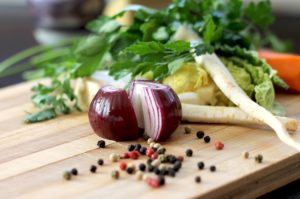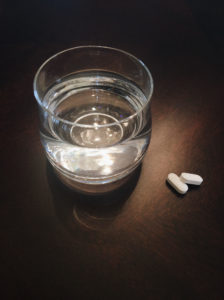Many experts refer to glut (pronounced “gloota-thigh-own”) as, “the most important molecule we need to stay healthy and prevent aging, cancer, heart disease, dementia and more, and necessary to treat everything from autism to Alzheimer’s disease.”1 Yet most of us, have never heard of it.
Glutathione is the MOTHER of all antioxidants. An antioxidant is a substance that removes potentially damaging oxidizing agents in a living organism, that is to say, it fights the bad guys within the body and plays a primary role in the protection of all cells from daily metabolic stress, and toxic chemicals. Glutathione is critical for one simple reason -it recycles antioxidants.
In our previous blog, “Why Is Glutathione So Vital” we discussed the pivotal role glutathione plays in our overall health. (In case you haven’t seen part 1, click here to read to it now…)
Now let’s discuss how can we preserve and boost our glutathione levels.
1. Focus On A Diet Rich In Colourful Fruits And Vegetables
I’m a big fan of having our needs met through our diet. That said, this involves sourcing organic foods (high in nutrition and free of pesticides) where-ever possible. Organic fruits and vegetables and their rich source of antioxidant phytochemicals and nutrients spare the use of glutathione and help to keep cellular levels high. At times, it is not feasible or possible to purchase organic produce and food items and that is when the following steps become even more important.
2. Focus On Sulfur-Rich Foods
Sulfur is an important mineral that occurs naturally in some plant and protein foods and is required for the synthesis of glutathione.
A number of human and animal studies have found that eating sulfur-rich vegetables may reduce oxidative stress by increasing glutathione levels5.
- Onions and garlic
- Vegetables such as broccoli, kale, collards, cabbage, cauliflower, watercress, asparagus, and parsley
- Avocado
- Walnuts
- Poultry, beef, and fish
- Egg yolks
- Cinnamon, cardamom, and curcumin also offer benefits.
- Non-denatured bioactive whey protein (not tolerated in all people)
Bioactive whey protein is a source of cysteine and the amino acid building blocks for glutathione synthesis. If this appeals to you then please ensure that you are getting the good stuff! Choose organic, non-pasteurized and non-industrially produced milk that contains no pesticides, hormones, or antibiotics creating a whey protein that is bioactive and made from non-denatured proteins (“denaturing” refers to the breakdown of the normal protein structure).
3. Exercise
Exercise boosts your glutathione levels and thereby helps boost your immune system, improve detoxification and enhance your body’s own antioxidant defenses. Regular physical activity, specifically cardio and weight training, seems to help increase glutathione levels. Completing a combination of both cardio and circuit weight training increases glutathione the most, compared to completing cardio or weight training alone.6
An overly aggressive exercise program right out of the gate can do more harm than good and inadvertently facilitate the production of those health-harming free radicals – so, don’t over-do it! Overtraining without a balanced diet and proper rest can deplete your levels.7
4. Eat Foods High In Glutathione
Dietary glutathione tends to be poorly absorbed by the human body. Additionally, cooking and storage conditions can decrease the amount of glutathione found in food. Despite not being able to massively increase our glutathione levels, glutathione-rich foods may help decrease oxidative stress. Dietary sources of glutathione include spinach, avocados, asparagus, peaches, walnuts, tomatoes, and okra.
5. Check-In On Your Liver
Glutathione is the single most powerful antioxidant your body produces and recycles. It’s made in the liver, the organ most responsible for detoxifying your body, so optimal liver function is absolutely essential. If your liver isn’t functioning well, glutathione production suffers, toxins overwhelm it and illness, both short term and long, are not far behind. Let’s not talk hormones here, but when the liver is overloaded it can’t make time to recylce and regulate hormones in the way we need and for both men and women they can get out of whack predisposing us to all sorts of things.
In our modern world it makes sense to support our liver regularly, here’s my favourite supplement for loving up this precious organ, Seeking Health’s liver-nutrients*.
6. Watch Your Toxic Load
One of the simplest ways to boost your glutathione levels is to decrease your intake of toxins! Be that via the creams and sprays you use on your skin and hair, toxins in the water you drink or the food you eat, even the air you breathe. The more conscious we become of how we take on toxins the more we can minimise this process and preserve our glutathione levels.
Easy ways to cut down exposure include: buying organic foods where possible, filtering your water; using gentler organic or homemade, natural cleaning products; reducing the use of personal care products; switching to glass for food storage and reheating.
Alcohol is one toxin we can easily minimise and it’s no surprise that adverse health effects are associated with chronic and excessive alcohol intake. People who regularly consume excessive amounts of alcohol can have an 80–90% decrease in lung glutathione.8
7. Wrangle Your Stress
Unmanaged, chronic stress depletes glutathione. Commit to keeping your stress levels under control! Take stress down a few notches with calming practices like meditation, mindfulness exercises, restorative yoga or tai chi.
8. Get Enough Sleep
 It seems that chronic lack of sleep can cause a decrease in glutathione levels. While getting enough sleep on a regular basis can help increase or maintain your levels.
It seems that chronic lack of sleep can cause a decrease in glutathione levels. While getting enough sleep on a regular basis can help increase or maintain your levels.
A study measuring glutathione levels in 30 healthy people and 30 people with insomnia found that glutathione peroxidase activity was significantly lower in those with insomnia.9 Multiple animal studies have also shown that sleep deprivation causes a decrease in glutathione levels.10
9. Get Your Vitamin A, C, and D, Zinc and Magnesium
These vitamins and minerals play a vital role in maintaining glutathione levels. For this reason, eating foods high rich in these or taking in supplement form, may help increase glutathione levels in your body.
10. Get Your Selenium.
Selenium important mineral helps the body recycle and produce more glutathione.
Your body relies on selenium, an important mineral, for many of its basic functions, from reproduction to fighting infection. The amount of selenium in different foods depends on the amount of selenium in the soil where the food was grown. Rain, evaporation, pesticides, and pH levels can all affect selenium levels in the soil.
Brazil nuts are your best source of selenium followed by beef, chicken, fish, organ meats, cottage cheese, and brown rice.
 Supplements Or Supporting Supplements.
Supplements Or Supporting Supplements.
To achieve optimal levels of glutathione, I also recommend supplementation.
Glutathione is created in the body from glutamic acid, cysteine, and glycine. Taking these amino acids can help the body naturally produce more, but the following products are my preferred supporting supplements because the production and recycling of glutathione in the body, requires many different nutrients.
Glutathione itself as a supplement is thought to be safe for all adults, tests have not been done however on pregnant women to claim safety in pregnancy. Speak to your health care provider about appropriateness in pregnancy otherwise focus on food sources of glutathione and supporting supplements that help manufacture glutathione.
I have looked at a lot of glutathone products over the last few years as I have certain genetic SNPs or gene variations that can make my detoxification processes inefficient. This means I tend to store toxins. Not ideal. I have however had noticeable changes swopping to Cellgevity because it contains Riboceine and provides the body with precursors so the body makes the glutathione it needs inside the cell. Riboceine appears to be incredibly effective at raising intracellular glutathione potentially better than NAC (which is the other precursor to glutathione). It may also be safer as the cysteine is released on demand only so no excess toxicity level has been found. Cellgevity which is riboceine plus co- factors has various anti -inflammatory and antioxidant ingredients to enhance effectiveness.
-
N-Acetyl-L-Cysteine NAC
NAC is a precursor for glutathione and supports the health of the liver, brain, lungs, and other body tissues. Many of the beneficial actions of NAC are related to its role in supporting normal production of glutathione. However some people find it can create gut irritability.
-
Oral Glutathione
Oral glutathione products that are readily available may not be as effective as NAC (a precursor) or Cellgevity (which contains co-factors for the body to make glutathione intracellularly) as the glutathione may be damaged or destroyed passing through our acidic stomachs. With very little making its way into the cell.
If you wish to take an oral glutathione* we recommend this one, Optimal Liposomal Glutathione which uses a unique liposomal delivery method to support optimal absorption of this fragile molecule through the digestive tract. Liposomes may be better absorbed across cell membranes in a way that is not possible for ordinary water-soluble or fat-soluble nutrients.
-
Methylation nutrients (folate and vitamins B6 and B12).
Methylation and the production and recycling of glutathione are the two most important biochemical functions in your body. Methylation nutrients are perhaps the most critical to keep the body producing glutathione. We have a series of blogs on how to identify if you have a methylation issue. Consider taking folate (especially in the active form of 5 methyltetrahydrofolate), B6 (in the active form of 5P) and B12 (in the active form of methylcobalamin). We love Ben Lynchs products Active B12 with L-5-MTHF or HomocysteX and also Thorne products.
-
Milk Thistle (Silymarin).
Milk Thistle has long been used in liver disease and helps boost glutathione levels. I love sourcing my Milk Thistle as a tea.
-
Turmeric Extract
Numerous animal and test-tube studies have shown that turmeric and curcumin extract has the ability to increase glutathione levels.11 Researchers conclude that the curcumin found in turmeric may assist in restoring adequate levels of glutathione and improve the activity of glutathione enzymes.
To experience an increase in glutathione levels, you would need to take turmeric extract, as it would be extremely difficult to consume the same levels of curcumin with turmeric spice.
 All Said And Done,
All Said And Done,
here’s the main take home:
Glutathione is a super important antioxidant that neutralizes and clears heavy metals and toxins from the body. Protects our DNA from damage, tampers down inflammation and helps fend off heart disease, cancer, neurological decline, dementia and many more of the debilitating diseases. It maintains optimal immunity and keeps our mitochondria pumping. It’s therefore incredibly important we maintain our glutathione levels.
If we are mindful, there are ways as outlined, that we can maintain and boost our glutathione levels through diet, lifestyle habits, and supplementation.
We hope you’ve found this article useful in securing your health.
. . . . .
 Yours in Health,
Yours in Health,
Jennifer Barham-Floreani
(Bach. Chiropractic, Bach. App Clinical Science
Registered internationally, no longer practicing as a chiropractor in Australia.)
. . . . .
References:
(1 and 3)
Hyman, M(May 2010). “Essential Glutathione: The Mother of All Antioxidants”. Hyman Digital, LLC [Online:Available] https://drhyman.com/blog/2010/05/19/glutathione-the-mother-of-all-antioxidants/
(2)
Nuttall, S, Martin, U, Sinclair, A, & Kendall, M (1998). “Glutathione: in sickness and in health.”. The Lancet 351(9103):645-646
(4)
Bewell.com (2018).”Glutathione: The Super Antioxidant Your Body Makes – And Why You Need More Now!” Dr. Frank Lipman [Online:Unavailable] https://www.bewell.com/blog/glutathione-the-super-antioxidant-your-body-makes/
Hashimoto K1, Takasaki W, Yamoto T, Manabe S, Sato I, Tsuda S.Effect of glutathione (GSH) depletion on DNA damage and blood chemistry in aged and young rats. J Toxicol Sci. 2008 Oct;33(4):421-9.
(5)
Moore LE1, Brennan P, Karami S, Hung RJ, Hsu C, Boffetta P, Toro J, Zaridze D, Janout V, Bencko V, Navratilova M, Szeszenia-Dabrowska N, Mates D, Mukeria A, Holcatova I, Welch R, Chanock S, Rothman N, & Chow WH(September 2007). “Glutathione S-transferase polymorphisms, cruciferous vegetable intake and cancer risk in the Central and Eastern European Kidney Cancer Study”. Carcinogenesis. 2007 Sep;28(9):1960-4. Epub 2007 Jul 7.
Bogaards JJ1, Verhagen H, Willems MI, van Poppel G, van Bladeren PJ(May 1994).Consumption of Brussels sprouts results in elevated alpha-class glutathione S-transferase levels in human blood plasma. Carcinogenesis. 1994 May;15(5):1073-5.
Bahadoran Z1, Mirmiran P, Hosseinpanah F, Hedayati M, Hosseinpour-Niazi S, Azizi F(May 11, 2011). “Broccoli sprouts reduce oxidative stress in type 2 diabetes: a randomized double-blind clinical trial”. Eur J Clin Nutr. 2011 Aug;65(8):972-7. doi: 10.1038/ejcn.2011.59. Epub 2011 May 11.
(6)
Elokda, AS1, & Nielsen, DH(October 2007). “Effects of exercise training on the glutathione antioxidant system.”. Eur J Cardiovasc Prev Rehabil. 2007 Oct;14(5):630-7. PMID: 17925621 DOI: 10.1097/HJR.0b013e32828622d7 https://www.ncbi.nlm.nih.gov/pubmed/17925621
(7)
Gambelunghe, C1, Rossi, R, Micheletti, A, Mariucci, G, & Rufini, S(March 2001). “Physical exercise intensity can be related to plasma glutathione levels.”. J Physiol Biochem. 2001 Mar;57(2):9-14. PMID:11579999 https://www.ncbi.nlm.nih.gov/pubmed/11579999
(8)
Joshi, PC1, & Guidot, DM(April 2007). “The alcoholic lung: epidemiology, pathophysiology, and potential therapies.”. Am J Physiol Lung Cell Mol Physiol. 2007 Apr;292(4):L813-23. Epub 2007 Jan 12. PMID:17220370 DOI:10.1152/ajplung.00348.2006 https://www.ncbi.nlm.nih.gov/pubmed/17220370
(9)
Gulec, M1, Ozkol, H, Selvi, Y, Tuluce, Y, Aydin, A, Besiroglu, L, & Ozdemir, PG(June 2012). “Oxidative stress in patients with primary insomnia.”. Prog Neuropsychopharmacol Biol Psychiatry. 2012 Jun 1;37(2):247-51. doi: 10.1016/j.pnpbp.2012.02.011. Epub 2012 Feb 28. https://www.ncbi.nlm.nih.gov/pubmed/22401887
(10)
Mathangi, D.C. 1,*, Shyamala, R.1, & Subhashini, A.S.2 (October 2012). “Effect of REM sleep deprivation on the antioxidant status in the brain of Wistar rats”. Ann Neurosci. 2012 Oct; 19(4): 161–164. https://dx.doi.org/10.5214/ans.0972.7531.190405 PMCID: PMC4117056 PMID: 25205991 https://www.ncbi.nlm.nih.gov/pmc/articles/PMC4117056/
D’Almeida, V1, Lobo, LL, Hipólide, DC, De Oliveira, AC, Nobrega, JN, & Tufik, S(August 1998). “Sleep deprivation induces brain region-specific decreases in glutathione levels.”. Neuroreport. 1998 Aug 24;9(12):2853-6. PMID: 9760133 https://www.ncbi.nlm.nih.gov/pubmed/9760133
Everson, CA1, Laatsch, CD, & Hogg, N(February 2005). “Antioxidant defense responses to sleep loss and sleep recovery.”. Am J Physiol Regul Integr Comp Physiol. 2005 Feb;288(2):R374-83. Epub 2004 Oct 7. PMID:15472007 DOI:10.1152/ajpregu.00565.2004 https://www.ncbi.nlm.nih.gov/pubmed/15472007
(11)
Hanif, R1, Qiao, L, Shiff, SJ, & Rigas, B (December 1997). “Curcumin, a natural plant phenolic food additive, inhibits cell proliferation and induces cell cycle changes in colon adenocarcinoma cell lines by a prostaglandin-independent pathway”. J Lab Clin Med. 1997 Dec;130(6):576-84. https://www.ncbi.nlm.nih.gov/pubmed/9422331/
Dorai, T1, Cao, YC, Dorai B, Buttyan, R, & Katz, AE(June 2001). “Therapeutic potential of curcumin in human prostate cancer. III. Curcumin inhibits proliferation, induces apoptosis, and inhibits angiogenesis of LNCaP prostate cancer cells in vivo.”. Prostate. 2001 Jun 1;47(4):293-303. https://www.ncbi.nlm.nih.gov/pubmed/11398177/
Donatus, IA1, Sardjoko, & Vermeulen, NP(June 1990). “Cytotoxic and cytoprotective activities of curcumin. Effects on paracetamol-induced cytotoxicity, lipid peroxidation and glutathione depletion in rat hepatocytes.”. Biochem Pharmacol. 1990 Jun 15;39(12):1869-75. https://www.ncbi.nlm.nih.gov/pubmed/2353930
Biswas, SK1, McClure, D, Jimenez, LA, Megson, IL, & Rahman, I(January 2005). “Curcumin induces glutathione biosynthesis and inhibits NF-kappaB activation and interleukin-8 release in alveolar epithelial cells: mechanism of free radical scavenging activity.”. Antioxid Redox Signal. 2005 Jan-Feb;7(1-2):32-41. https://www.ncbi.nlm.nih.gov/pubmed/15650394



 Supplements Or Supporting Supplements.
Supplements Or Supporting Supplements. All Said And Done,
All Said And Done,